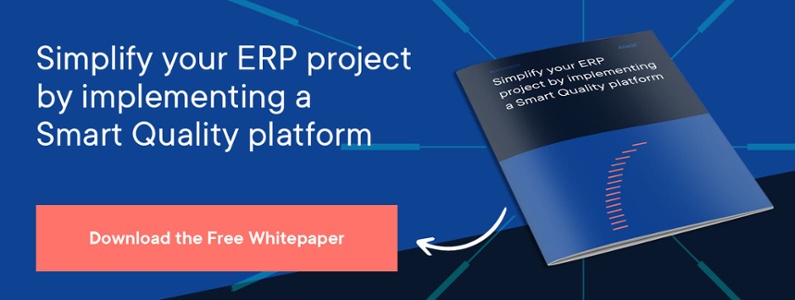Solvers help you monitor quality, apply SPC, manage equipment, and ensure traceability.

ERP or standalone QM: best of breed or suite, that’s the question…
In the era of Industry 4.0 and smart manufacturing, quality management is also changing fast. Ad hoc and isolated quality processes are being modernized to become increasingly smart and omnipresent to achieve what we call Quality Intelligence.
Where are you on this journey? Many of the manufacturers that complete our Quality Intelligence maturity scan find themselves in the ad hoc/isolated quadrant of the diagram below. This is not where they want to be. Their ambition is to re-purpose QM towards the top right-hand quadrant, where agility, advanced data analytics, and automated workflows are some of the key advances.
How can IT make this happen for your business? Many business and IT leaders are unsure if their ERP system can trigger this transition, or if a dedicated quality platform is required. In the tech industry, this is referred to as the Best of Breed versus Suite dilemma. In this blog post, we discuss the differences between the two approaches.
Manufacturing ERP systems
All manufacturing companies of any size have an ERP system in place. In the industries we serve (Chemicals, Food & Beverage, Automotive and Manufacturing), SAP, Navision, AX, Exact and JDEdwards are the most common. These ERP systems do an excellent job in dealing with the primary processes from order to delivery, and all the administrative aspects involved.
Some of these powerful systems also provide some kind of quality management functionality as an add-on, which begs the question of why you would need a dedicated QM tool at all. Reasonably enough, our prospects ask us: “How does AlisQI stack up against the QM functionalities of an ERP system we already have? Which is best for my business?”
When to use your ERP QM module
You could be served perfectly well by your ERP system if all you want to do with your quality data is to store it within the logistics administration as an attribute of your product. In other words, if you only need to have quality data available in case of a recall or a customer complaint, your ERP system would provide a solid solution.
However, if you want to learn from your data, you might want to think twice about sticking to your ERP system and look into more advanced alternatives.
When to use a Quality Intelligence Platform
If you want to lead your industry with continuous data-driven improvements, you need advanced quality data analytics. Your quality platform should be capable of detecting drifting processes and notify your team proactively. This requires substantially more intelligence than simply recording quality as an attribute of your orders. It is in this area of data analytics that AlisQI stands out.
By activating the AlisQI Document Management System and QESH Management add-ons, you create a fully integrated Quality Intelligence platform. This platform helps you with smart automation and the integration of quality in all your processes and activities.
Why our customers prefer AlisQI
We asked our customers why they opted for AlisQI over the QM module of their ERP system. This is what they highlighted:
| ✓ Smart combination of Quality Control + Compliant Document Management + QESH Management | ✓ Built-in Statistical Process Control alerts, reports and charts |
| ✓ Accessible for the entire organization | ✓ Integration with supplier and customers |
| ✓ Very easy to use and learn | ✓ Agility and adaptability |
| ✓ No-code QMS for non-developers | ✓ Transparent pricing with site license |
This boils down to the two key aspects of Quality Intelligence:
- Smart automation of quality management processes and activities
- Omnipresence of quality management in the organization and supply chain
Best of both worlds: SAP & AlisQI
The good news is that you do not need to choose between SAP and AlisQI. Just use both systems for the purpose for which they were intended: SAP as your ERP system and AlisQI connected to it as your integrated Quality Intelligence platform.
With our API, we can connect AlisQI to any ERP system, not just SAP. We typically synchronize products, customers, and manufacturing orders between these two systems. This way you benefit from all the intelligence AlisQI brings to the table, without saving to duplicate your ERP data management.
Simplify your ERP project by implementing a smart quality platform
The quality management modules offered by ERP vendors are not best-of-breed and customization means delay, uncertainty, and spiraling costs. Before going this route, consider leaving quality out-of-scope in your ERP project. This whitepaper illustrates how a smart quality platform might boost both your quality and your ERP project in one go.


